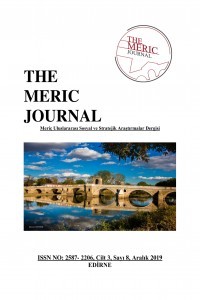YAYGIN EĞİTİMİN (HALK EĞİTİMİ MERKEZLERİ) KADIN GELİŞİMİ ÜZERİNE GENEL BİR BAKIŞ
Non-Formal Education, Public Education Centers, Course, Women, Yaygın eğitim, Halk Eğitimi Merkezleri, Kurs, Kadın
AN OVERVIEW ON WOMEN'S DEVELOPMENT IN NON-FORMAL EDUCATION (PUBLIC EDUCATION CENTERS)
Non-Formal Education, Public Education Centers, Course, Women, Yaygın eğitim, Halk Eğitimi Merkezleri,
___
- Abay, C., Atış, E. & Saner, G. (1999). The Effect of Training for Rural Women on Employment in İzmir. T.R. Prime Ministry General Directorate of Women's Status and Problems, Cem Web Ofset Publications, Ankara.
- ASPB. (2014). Analysis of Female Labor Force Profile Statistics in Turkey. 20 April 2015.
- Ayçiçek, K. (2012), Şişli Municipality as an Example of Non-formal Education Studies of Municipalities. Istanbul Aydın University Institute of Social Sciences, Department of Business Administration, Department of Local Administrations and Decentralization, Master's Thesis, Istanbul.
- Betam. (2010). Increasing the Labor Force Participation of Disadvantaged Groups in Employment. Bahçeşehir University, Center for Economic and Social Research, p. 1-91.
- Celep, C. (2003). Public Education. Ankara: Memoir Publishing.
- Dedeoğlu, S. (2012). Textile Industry and Women Workers in Turkey, Gaziantep, Kahramanmaraş, Malatya and Adıyaman Research. Handbook of Textile Industry and Women Workers in Turkey, ILO Turkey Office- Ankara-ILO.
- Geray, C. (2002). Public Education. Ankara: Image Publishing.
- Güvenli, G. (2017). An Example of a Vocational Education Project in the Cooperation of Non-Governmental Organization, University and Public: Women from Soma Enlighten the Future. 44 p. file:///C:/Users/user/Desktop/kad%C4%B1n/__KADINLARIN%2 MESLEK%C4%B0%20E%C4%9E%C4%B0T%C4%B0M%C4%B0%20VE%20KADIN%20%C4%B0ST%C4%B0HDAMI%20SEMPOZYUMU.pdf
- İçli, T., Akhun, İ., Kavak, Y., & Senemoğlu, N. (1999). Contribution of Labor Force Training Courses to Female Employment. T.R. Prime Ministry General Directorate of Women's Status and Problems, Cem Web Ofset Publications, Ankara.
- İŞKUR. (2007). https://media.iskur.gov.tr/13568/2007-yili-faaliyet-raporu.pdf
- İŞKUR. (2013). 7. General Assembly Working Reports, Ankara.
- Karabıyık, İ. (2012). Women's Employment in Working Life in Turkey. Journal of Marmara University Faculty of Economics and Administrative Sciences, 32(1), 231-260.
- Karabulut, T., & Mızırak, Z. (2017). The Importance of Vocational Education Activities of Local Administrations for Women to Acquire a Vocation: The Case of Konya. 48p. file:///C:/Users/user/Desktop/kad%C4%B1n/__KADINLARIN%20MESLEK%C4%B0%20E%C4%9E%C4%B0T%C4%B0M%C4%B0%20VE%20KADIN%20%C4%B0ST%C4%B0HDAMI%20SEMPOZYUMU.pdf
- National Education Basic Law No. 1739, RG. 24.06.1973-14574.
- Öksüz, (2007). The Contribution of Vocational Training Courses to Women's Employability and Roles that İŞKUR Can Take. T.R. Ministry of Labor and Social Security, General Directorate of Turkish Employment Agency.
- Sağlam, M. (2015). Contribution of Vocational Training Courses Given in Non-formal Education Institutions to Women's Employment: The Example of Muğla Menteşe Municipality. Süleyman Demirel University, Institute of Social Sciences, Master's Thesis.
- Sağlam, M., & Korkmaz, A. (2019). Contribution of Vocational Training Courses Given in Non-formal Education Institutions to Women's Employment: The Example of Muğla Menteşe Municipality. MAKÜ- Bucak Faculty of Business Journal, 2(1), 54-76.
- Soylu, Y., Ercan, G. S., Belkıs, Ö., Durdağı, E., & Siyez, D. M. (2017). An Investigation of the Opinions of Psychological Counselors Working in Public Education on the Empowerment of Women through Vocational Education. 26 p. https://www.yok.gov.tr/Documents/Yayinlar/Yayinlari/Kadinlarin_Mesleki_Egitimi_ ve_ Kadin_%C4%B0stihdami_Sempozyumu.pdf.
- Şener, Ü. (2011). Social Impact Analysis on Women's Work. Tepav Publications, Ankara. Taş, H. Y. (2011). The Effects of İŞKUR's Vocational Training Activities on Employment: The Case of Yalova İŞKUR. Journal of Social Politics Conferences, 61(2), 153-176.
- Taşpınar, M. (2013). Vocational Training of Female Labor Force. Ministry of National Education, International Conference Articles, (http://kizlarinegitimi.meb.gov.tr/files/ img/mesleki_egitim_kadin.pdf), (Date of Access: 10.10.2021).
- Temiz, M. (2009). Investigation of Self-Efficacy Levels of Vocational-Technical and Social-Cultural Course Teachers in Public Education Centers. Marmara University Institute of Educational Sciences, Department of Educational Sciences, Department of Public Education, Master's thesis, Istanbul.
- Topoğlu, S. (2007). Inequality of Opportunity in Women's Employment Social Exclusion; Turkey-EU Comparison. Istanbul University Institute of Social Sciences, Department of Economic Policy, Master's Thesis, Istanbul.
- TÜİK, Periodic Results of the Household Labor Force Survey.
- TÜİK, (2018). Labor Statistics. http://www.tuik.gov.tr/PreTablo. do?alt_id=1007 (Date of Access:10.05.2021).
- Türkoğlu, A., & Uça, S. (2011). Public Education in Turkey: Its Historical Development, Problems and Solution Suggestions. Adnan Menderes University Faculty of Education Journal of Educational Sciences, 2(2), 48-62.
- URL1.https://edirne.meb.gov.tr/www/edirne-halk-egitimi-merkezi-kursiyerlerimizin- emegimiz- kazaniyor-projemiz-kapsaminda-urettikleri-el-emegi-goz-nuru-urunleri-edirne-esnafimiza-tanitildi/icerik/3654 T.C. Milli Eğitim Bakanlığı, Edirne il milli eğitim müdürlüğü, 30 Ocak 2020.
- URL 2. http://dhgm.meb.gov.tr/yayimlar/dergiler/Milli_Egitim_Dergisi/144/kavak.htm
- URL 3. file:///C:/Users/user/Desktop/OKUL%20DI%C5%9EINDA%20%C3%96%C4 ERENME%20%C4%B0MKANIN%20SUNAN%20HALK%20E%C4%9E%C4%B0T%C4%B0M%20MERKEZ%C4%B0%20-%20Nurhak%20Halk%20E%C4%9Fitimi%20Merkezi.pdf
- URL4. http://www.yesilyurt.bel.tr/haberler/55-farkli-branstaki-248-kurstan-5-297-vatandas-faydalandi
- URL 5. https://www.ensonhaber.com/ekonomi/agrida-kursa-gelen-genc-kizlar-ceyizlerini-burada-tamamladi
- URL 6. https://www.google.com/search?q=malatya+battalgazi+belediyesi+halk+e%C4 m+kurslar%C4%B1&sxsrf=AOaemvJUWfbadqE6M7F_Uq6Tx_epgxhq4Q:1636968999895&source=lnms&tbm=isch&sa=X&ved=2ahUKEwjNofzdiJr0AhVy_7sIHQ4zC0kQ_AUoA3oECAEQBQ&biw=1522&bih=738&dpr=1.25#imgrc=q7Y09uxWIG9SeM
- URL 7. https://battalgazi.bel.tr/p/battalgazide-kadinlar-meslek-ogreniyor-1619599748737
- URL8.file:///C:/Users/user/Desktop/kad%C4%B1n/T.C.%20Erbaa%20Belediyesi%20Resmi %20Web%20Sayfas%C4%B1.pdf
- Yayla, D. (2009). Evaluation of Turkish Adult Education System. T.R. Ministry of Education, Education Research and Development Department (EARGED). Ankara, 2009.
- Yazar, T. (2012). Introduction, Target Audience in Adult Education. Journal of Dicle University Social Sciences Institute, 4(7), 21-30.
- ISSN: 2587-2206
- Yayın Aralığı: Yılda 3 Sayı
- Başlangıç: 2017
- Yayıncı: Stratejik Sosyal ve Kültürel Araştırma Derneği
Kalite Yönetimi Çalışmalarına Katılım ile Hizmet İnovasyon Düzeyi Arasındaki İlişki
21. YÜZYILDA KENTSEL DÖNÜŞÜM VE YENİ EĞİLİMLER
Selin ARABULAN, Bünyamin DEMİREL
YAYGIN EĞİTİMİN (HALK EĞİTİMİ MERKEZLERİ) KADIN GELİŞİMİ ÜZERİNE GENEL BİR BAKIŞ
AVRUPA BİRLİĞİ GÜVENLİK VE SAVUNMA POLİTİKASININ NATO İLE İLİŞKİLER BAĞLAMINDA ANALİZİ
